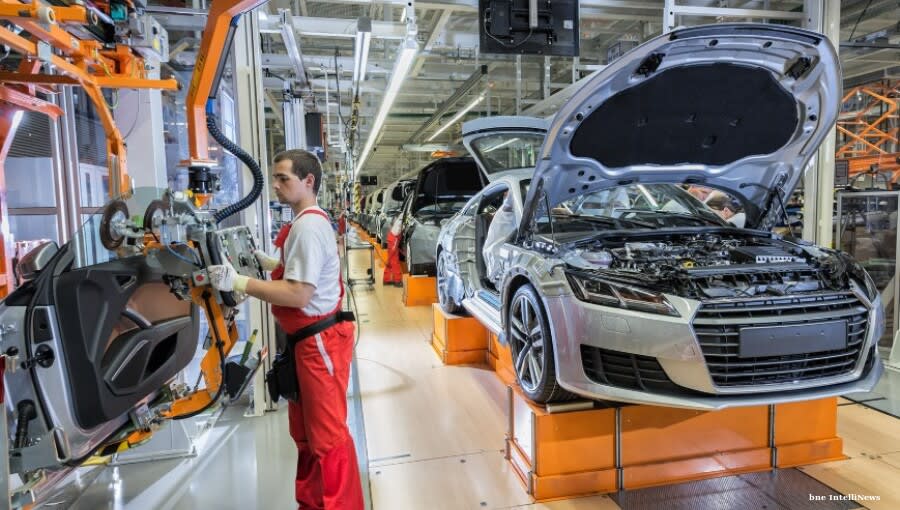
Foreign Minister Peter Szijjarto stated at the 11th Automotive Industry Conference organized by the state investment agency HIPA on May 13 that ongoing initiatives in Hungary’s automotive industry will boost yearly production to over 1 million vehicles and 2 million engines. Additionally, he noted that Hungary will possess the globe's second-highest electric vehicle battery manufacturing capability.
The gathering was attended by leaders from prominent automobile companies.
With more than HUF13.7 trillion (€34.7 billion) in automobile production last year, Hungary is poised to emerge as a significant player in the region, according to the minister.
Since HIPA was established in 2014, it has backed 244 significant investments, resulting in an overall investment volume of HUF6.1 trillion.
Szijjarto proceeded to outline the local manufacturing capabilities within the industry. Starting in September, BMW plans to commence production, focusing solely on its all-electric Neue Klasse models at its facility in Debrecen, Hungary. Meanwhile, Mercedes has integrated the output capacities of its plants, positioning its factory in Kecskemét as the biggest Mercedes plant globally, excluding those in China.
Audi, which leads as Hungary’s top exporter, is running at maximum production capacity due to strong export figures, while Stellantis has increased its engine orders by 130,000 units from the previous year. Additionally, Suzuki is currently undertaking significant improvements through the government-backed ‘100 factory program.’
Hungary has drawn BYD's initial European facility along with five out of the globe’s top ten biggest battery producers, such as CATL, set to commence operations prior to year-end.
Szijjarto held back from criticizing European policymakers, sharply attacking Brussels for engaging in 'politically motivated' policy-making. from imposing taxes on imported cars from China towards disconnecting from Chinese producers.
'A standalone European automotive sector cannot thrive; it leads to a stalemate.'
Szijjártó reiterated the government’s familiar talking points about the conflict and sanctions, blaming Europe for extending the war and losing access to inexpensive energy by severing ties with Russia. He further stated, ‘Rather than backing initiatives aimed at achieving peace, Europe opted to hinder these efforts. This decision cost them affordable energy, estranged major players such as China, and forced them into a framework where they can’t emerge victorious,’ he explained.
According to the minister, 'European leaders appear to vie for who can be more antagonistic toward Washington and more adversarial toward China.'
Hungary has emerged as a 'crossroads' where businesses from Eastern and Western regions converge, serving as a model for the achievements within the automotive sector. The speaker emphasized the collaborative efforts between German and Chinese firms in local production activities. They also reassured participants in the industry that the Hungarian administration considers these enterprises vital partners and remains committed to providing every possible assistance.
Despite facing global challenges, Hungary’s automotive industry continues to thrive due to the growth of automobile production and the development of its battery infrastructure, according to HIPA CEO Istvan Joo during his address.
The agency revamped its investment subsidy program, redirecting its focus towards initiatives that offer greater value addition to place Hungary on the world’s innovative map within the automotive industry, with an emphasis on developing the lesser-advanced southern areas.
As reported recently, the state secretary of the Foreign Ministry mentioned a significant automobile investment initiative in the nation’s southern area during an interview. Levente Magyar disclosed that negotiations are currently underway with several Chinese automotive companies, and the administration aims to finalize an agreement prior to the 2026 elections.
The initiative will take place in Pécs, close to the Serbian border, within a 600-hectare industrial area. Over the past decade or so, both the South Transdanubian and Southern Great Plains areas have been left behind during the region’s industrial expansion. It is now essential for the government to tackle this issue by offering additional incentives to businesses willing to invest in these locations, as mentioned by him. However, Magyar didn’t disclose which firms were engaged in discussions or how large such investments might become.
Weeks before The trip of Chinese President Xi Jinping to Hungary in May 2024 There were rumors suggesting that the gathering might be used to unveil significant investments in the nation’s southern area. Meanwhile, reports in the financial media buzzed with talk of a potential new facility near Pécs being constructed by China’s Great Wall Motor (GWM).

Posting Komentar
Posting Komentar